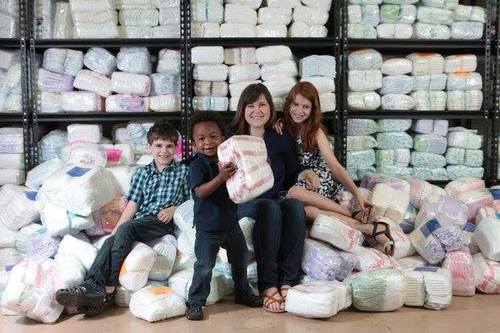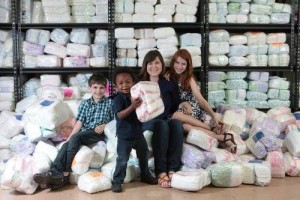Prior to 2013, Michelle Old always thought she would continue policy writing to stop violence against women. She didn’t think a cold warehouse full of diapers and wipes would fill her with joy and passion and challenge her. She had no way of predicting that she would need to quickly learn the ins and outs of warehouses and rotating stocks, that she would start a nonprofit which, in just over three short years, would have three branches and supply over two-million diapers a year to families in need.
You may have heard of Michelle and the >>NC Diaper Bank . Her journey to diaper North Carolina babies started in 2012 when her infant son was hospitalized from a diaper rash. She was going through 15-20 diapers a day and thought about the additional stress that must befall parents when they can’t reach for the next diaper. She became “obsessed” with the idea of relieving that stressor for parents and helping babies be healthier, so obsessed that she and her husband had to rework their budget so that they could raise their family of three children on one salary when she quit her job to start the bank.
In 2013, she opened her doors (Literally. She started with diaper drives and distributions out of her own home.) and a goal of 50,000 diapers. The first year she distributed 209,000 in the Durham area alone. Now there are two more branches, one in the greater Triad and one in Lower Cape Fear. The hard work, innovation and intrepidness soon gained her >>national attention . Ironically, it was >>a robbery at the diaper bank in 2014 that brought >>even more press — garnering community support to replace the 13,000 stolen diapers with 130,000 in one week
Michelle will tell you that it’s community that keeps the diaper bank going. Between all three branches, there is only one full time employee on the payroll. Two-hundred-and-fifty people volunteer each month to wrap and help distribute diapers. All of her warehouse space (and the machinery and manpower to help unload trucks) is donated by a local business man. She has formed a partnership with Huggies who delivers trucks of diapers (for a large price, but still deeply discounted) and with a local diaper making company that donates the “irregulars.” These partnerships with the diaper making community have allowed Michelle to shift her focus from gathering diapers to identifying gaps in the community and helping to close them.
From the outside, it looks like it’s been a smooth, easy road, that here came a woman with an idea and the community made it happen.
What many people don’t realize is that learning how to run the diaper bank meant more than diaper drives. It meant figuring out the logistics of a warehouse, operating a non-profit, forging partnerships, doing research and writing grants. It meant that the executive director became a recipient of donated diapers for her own diaper bank when she had to forego a salary for the first two and a half years.
There have been more sacrifices than money. Sometimes she is afraid that when her children look at her, they only see an Apple where her face should be because she is constantly behind her Mac. While feeling guilty about this, she wants them to know that it is because she is working wholeheartedly for a cause she believes in. One day, she hopes, they will find their passion and give it their all, like they see their mom doing.
Despite her success and passion, or maybe because of it, Michelle isn’t content with limiting the diaper empire she’s constructed to covering baby bottoms in the areas of the three branches. She is aware there are lots of rural areas that aren’t being touched and that the more diapers she can give out, the more services these families receive.
This is why Michelle set up the diaper bank to be a model that can easily be replicated all over the state and why she distributes the diapers to partnering organizations, not individual families in need. Her model helps to fill societal holes.
For example, the Early Childhood Learning and Knowledge Center provides subsidized diapers during the school day. The teachers noticed, though, that the children would return to school the next day in the same diaper they left in, or that they would return on a Monday with “weekend diaper rash.” So Michelle gives diapers to fill the gap of evenings and weekends.
Her organization is also one of the few that does research to prove that providing diapers promotes a healthier life and a better society in other ways.
One of the clinics that she partners with noticed that when families have fallen behind on their immunizations, they can have the parents come by to get diapers and vaccines at the same time. When social workers from another organization make house visits with diapers, families are there to receive them and stay in the program longer.
The vision of NC Diaper Bank has also expanded from “ensur[ing] that families and babies living in poverty have an adequate supply of diapers” to making sure that “every family in North Carolina will have access to basic necessities to support their dignity health, and quality of life.” It does this by also providing adult incontinence products to participating programs, and, most recently, feminine hygiene products to all of the Durham Public Schools.
This development came about naturally for Michelle. She started thinking about the mothers who need diapers for their babies would also need sanitary products. She wanted to help mothers help themselves so they could help their babies, but then she began to hear from middle and high school teachers who reported that girls would stay home from schools during their menstrual cycles. Michelle was shocked. “This is a third-world problem,” she thought, “not something you think is occurring in the Triangle.” But now that she knew it was happening, she had to do something.
And she is. And so is the community, donating feminine hygiene products that are (like diapers) considered >>a luxury item , taxed, and not covered by WIC or SNAP. Because she doesn’t have the partnerships that she does with diapers, her focus is on gathering the materials and getting them to the schools, training social workers to freely give them out with no shame, and collecting information about how much is needed. Her first order was for over 1,000 products and seven schools have already reordered. For phase two, she will have signs in the bathrooms letting girls know that they can ask for the items and that they can bring them home for themselves and family members.
Michelle is very focused on allowing women to run full and complete lives: “We can’t make people feel guilty for taking care of their families and putting them first.” Having diapers for their babies is shown to >>increase maternal health and having access to feminine hygiene products allows them to go to work or school. Operating one of the few non-profit organizations in the state run by women is another way, and she leads by example.
Michelle thinks that sometimes women doubt themselves and stop short. She hates this. She knows that if women talk to each other and combine their talent, they can do great things. Despite her surety, she sometimes wonders if she is the right person to be doing this work. But, she is the person doing it and moving forward. She saw a need in North Carolina and has rallied the community to help her meet it.
Donating size five diapers or pull-ups is a great way to start while we find our own passions to make our state —and our families— strong again.
Jennifer Brick is a freelance writer and former teacher in Durham, North Carolina. She earned her Masters of Fine Arts in Creative Nonfiction from Goucher College. Follow her on Twitter @jenbrickwrites.


There are no comments
Add yours